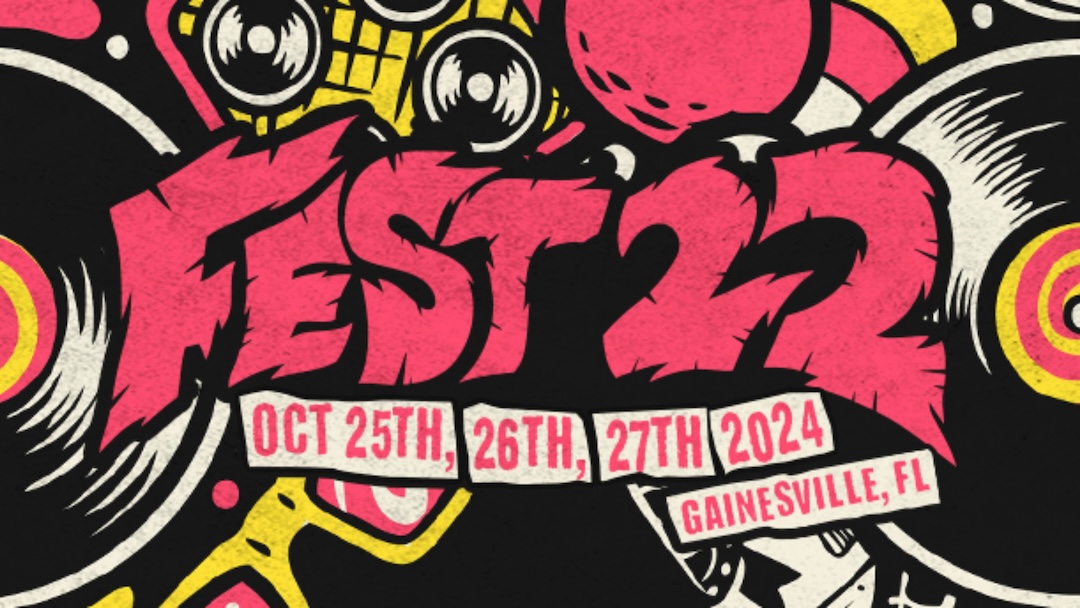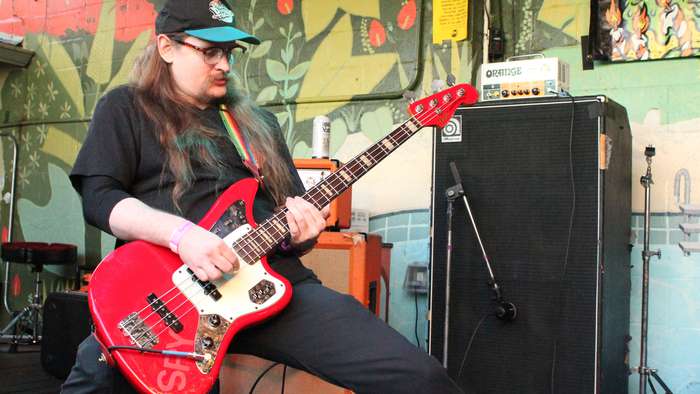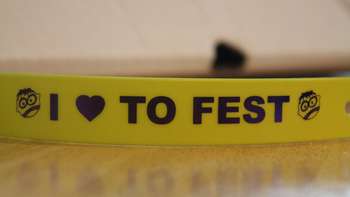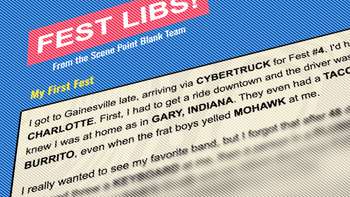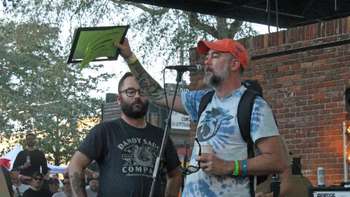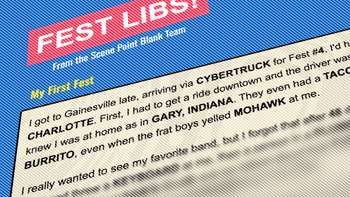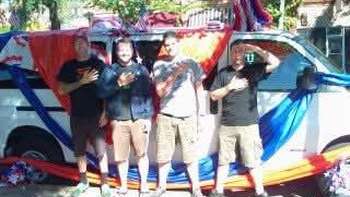J. Robbins
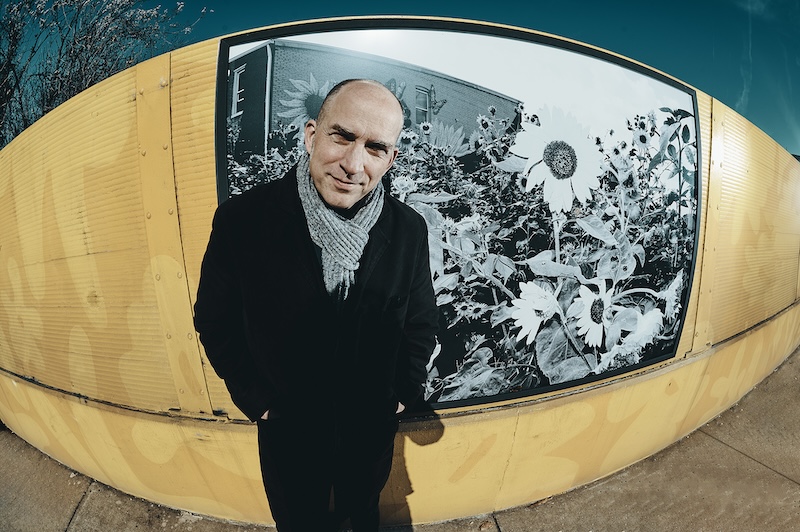
Scene Point Blank: First, how many times have you played The Fest? How many times have you personally attended (if that # is different)?
J. Robbins: I’ve only ever played, I’ve never gone just to attend. My first Fest experience was playing at FEST 12, and I’m trying to count up the number of times since then … it might be 6 times so far, in different bands. I don’t think I’ve actually been to 6 Fests, but I’ve played multiple sets in a couple of them (solo acoustic, acoustic duo with Gordon Withers, Report Suspicious Activity, Jawbox, J. Robbins band …actually 8 if you count me playing bass for Airstream Futures with no rehearsal one year, and playing third guitar for Daria another. So I guess this will be my 9th time.
Scene Point Blank: There are a million festivals these days. What makes The Fest stand out?
J. Robbins: So many things! They’ve been doing it so long, it’s always been DIY but run really well… It’s always been such a labor of love, and you could always feel that… and the feeling of “the punks are taking over the town” for the whole weekend, that is just priceless. It's quite utopian in a way. I feel like people really take it personally -- the organizers and the bands and attendees… It’s lovely.
Scene Point Blank: There are 300+ bands at FEST 22. Any idea how many of them you've worked with in the past? How big of a "family reunion" is it for you?
J. Robbins: War on Women, Heavy Seas, Pohgoh … that might actually be it this year. There have certainly been a bunch more in the past. But it will still have the family reunion feeling. Plenty of bands I know and like (but haven’t necessarily worked with) as well.
Scene Point Blank: What was the first festival you ever played -- what band were you in and what are your memories?
J. Robbins: It might have been the HFStival, in DC, back in the ‘90s, with Jawbox. That was a giant alternative rock radio festival, and we were the first band on the main stage. We played at 11am or noon, as people were entering the stadium, so it was pretty funny. Everything felt so far apart, and so empty, and it sounded cavernous. And you’d look out and people were entering the space from so far away, and they were kind of running to get their spots for the day. Very weird. But Jawbox played at Primavera Sound in Barcelona back in 2022, and that was extraordinary -- much bigger and slicker than The Fest, but you could still feel that “labor of love” feeling. I haven’t played a bunch of festivals, but I have certainly played some that didn’t give me the warm feeling of The Fest.
Scene Point Blank: As somebody who has played in some well recognized bands and now playing solo, how do you approach solo shows? How do you feel about people requesting songs from other projects, etc?
J. Robbins: If it’s a solo or duo acoustic set, there are plenty of songs from my bands that just wouldn’t translate to that setting, and in fact it would be ridiculous to try it. If I can play a Jawbox or Burning Airlines song or whatever band, in an acoustic setting and it makes sense, I’m excited to do it. But most of the songs I’ve been writing more recently, I’ve been mindful that I want to be able to play them like that. If it’s J. Robbins band, though, we are really sticking mostly to stuff from my two records. If Pete Moffett is playing drums, we can do some Burning Airlines tunes; and there are some Office of Future Plans songs that we can do too. I just want to play songs that feel like they can connect. But honestly I’m just glad if anyone listens and gives a shit about anything I’ve done.
Scene Point Blank: When did you become fully comfortable performing as a solo musician after starting with bands?
J. Robbins: Still working on it! It’s a lifelong process and that’s probably a big part of why I like it.
Scene Point Blank: Let's talk about Basilisk. As a producer yourself, how do you approach recording your own work? Matt Redenbo was a co-engineer on this release. How do you share duties? Do you have a "musician mode" and a "producer mode" or is it all the same approach for you?
J. Robbins: For my own records, those modes overlap for sure. Matt has assisted and co-engineered on my stuff for a while now. For Basilisk, the drum recording setup was a lot of my defaults, I got pretty hands-on about that, but by the same token we used a few of Matt’s mics -- but basically my strategies… I mean, it’s impossible to make a bad recording of Darren Zentek, he just sounds great in himself, and you point mics in his direction, and you’re done (same goes for Pete Moffett). But for the guitars and bass, I really didn’t want to be the engineer -- I had a very distinct concept about the guitar, and I wanted us to get sounds we were psyched about coming out of the amps, but then leave it up to Matt to capture that, as far as mic choice and placement, etc, so I could just be the producer and the person in the band from that point onward and not be worrying about technical stuff. And then once we were set up, Matt ran the tape machine, he ran ProTools, and he was a good soundingboard. He’s a person who just puts out fantastically good vibes, he's great to just be in a room with. For basic tracks, we all kind of pitched in together as far as making decisions about what were the good approaches and good takes. For most of the songs that clearly sound like a band playing, those are actually live takes of me and Brooks and Darren playing together, with just a couple of things like keyboards and whatever added later in some spots. Once that part was done, for the most part I recorded vocals and overdubs, and mixed, by myself at home. And there are a few tracks like “Sonder” and “Dead Eyed God,” that were not “band in a room” tracks, where I just did most of that by myself.
"I’m very very lucky that I have super talented and creative friends who are willing to bring their energy to these songs [...] that I’ve been living with forever then get to feel new to me again."
Scene Point Blank: You don't release a lot of solo material, yet Basilisk feels very unified. Did you approach it from the beginning with the intention of it being an album?
J. Robbins: I'm glad to hear you say it's unified! I knew I wanted to make an album, rather than just keep releasing individual songs on Bandcamp or something, but there was not a concept other than to write a lot and listen to what it was that wanted to come out of me. I just wrote and wrote and worked up demos of every idea, no matter what it was. I wanted to run toward every idea no matter how different it was from the last one. Just do my best at whatever occurred to me to do, and embrace it. And then I kept going til I had too much material, and then tried to put the things together that felt like they wanted to go together, to make a good arc of an album. I am glad it worked out; it didn’t always feel like it was going to work out.
Scene Point Blank: Perhaps I'm mistaken or the pandemic screwed up my memory, but I feel like you're touring and playing live more this year? Is there a specific inspiration behind that?
J. Robbins: Creatively, as far as making new music, this is my focus now. It’s not like Jawbox is my main focus and this is something I dabble with on the side. I was really proud of Un-Becoming, my first solo record, but it came out in 2019 at the exact same time as the Jawbox reunion tour, and then the pandemic happened, so I was not able to get out and play those songs in front of people in the way I might have liked to. I kind of swore to myself I would do more to get behind this record and see where it might lead. And getting older -- especially with the loss of so many people who really inspired me, like Geordie Walker from Killing Joke, or Steve Albini -- I feel a sense of urgency, like I really want to “rage against the dying of the light” and do this sort of thing while I feel energized and as long as I’m still capable.

Scene Point Blank: Is it different bringing solo material to life live, as compared to songs that were composed in a more collaborative band setting?
J. Robbins: In many ways the actual writing is much easier, and it makes more sense to me, because if you’re writing in a fully collaborative mode, you have to steer the ship collectively -- and sometimes you end up going in circles. But if you bring a finished song to a band, then the framework is already in place and there’s a different kind of collaboration that can happen. Sometimes when a song was put together on a computer, it can be hard to make it work in the hands of a group. Maybe there is something in a demo that I worked up (usually in the drums) where a real drummer just wouldn't ever play it that way, or the dynamics don't work in the real world. But I’m very very lucky that I have super talented and creative friends who are willing to bring their energy to these songs, and who can hear the intention and are sympathetic to it, and they bring the right kind of different perspective so that these songs that I’ve been living with forever then get to feel new to me again. And I want the band to have the freedom to mess with the arrangements so things can be different from the record if we want, and the music will have a good kind of band energy live.
"Allowing the freedom to play the same songs different ways is also a big part of this project for me"
Scene Point Blank: What song on the new record is the most fun to play live?
J. Robbins: I love “Dead Eyed God.” It’s not a strict rendition of the album version, and it can change a lot depending on who is playing drums, but the main gist of the song still always comes across and it feels great to play it loud.
Scene Point Blank: How do you recreate the electronic elements on Basilisk in a live setting? Do you prefer to strip it down or do you use samplers?
J. Robbins: It’s a combination. We have been using a sampler pedal, but sometimes it feels better to just play things in a more raw way. Allowing the freedom to play the same songs different ways is also a big part of this project for me.
Scene Point Blank: We interviewed Don Zientara recently. Did you work with him at all in your career and did his production inspire you in any direct way?
J. Robbins: Don is a massive inspiration. He’s recorded bands of mine a few times over the years, and he also gave me a huge break many years ago by inviting me to run the “B” Studio at Inner Ear, which was really the beginning of my going full-bore into recording. I think his greatest gift as a producer is his ability to foster people’s trust in themselves and in the moment. Like Matt Redenbo, he’s a person of extraordinary good vibes. It’s that innate understanding that you’re not really recording instruments, you’re recording people.
Now, a rapid fire Fest-focused Q&A:
